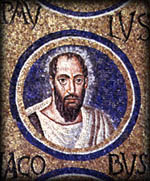
Do ALL:
1. The event Christians call “Pentecost” is described in Acts of the Apostles, ch. 2; the word literally means “count to 50” (so a feast marking 50 days). In Judaism (Leviticus 23:15-21 and elsewhere) this harvest festival takes place fifty days after the Passover, which makes it, in a sense, a feast of gratitude for what took place seven weeks (or so) after Passover: God’s revelation to Moses at Mt. Sinai. So if the crucifixion of Jesus (and subsequent resurrection) took place around Passover (all four Gospels take this position), then what is described in Acts 2 is symbolically linked to (extending, revising, replacing) what happened in the Book of Exodus (the revelation at Sinai and all that entails). In what sense then do you think the Jewish-Christian Pentecost is working in relation to the Jewish Pentecost?
2. In his Acts of the Apostles, Luke tells the story of Paul’s “conversion” on three different occasions (Acts 9:3-4, 22:6-7, 26:13-14 … which makes you wonder why Luke wants to tell it three times). Crossan (p. 167) says that this experience is a trance of some kind (“there can be no doubt that Paul’s own experience involved trance–that altered state of consciousness” and then he says that Luke’s accounts “all agree on its dissociative character”). Crossan seems to be forgetting his own methodological rule that stories written about events are often very different from the original events. Paul himself gives three very different sorts of accounts and only the second (which doesn’t explicitly link to the conversion experience) has anything like a trance. So read the following from Paul’s letters: 1 Corinthians 15:1-10; 2 Corinthians 12:1-10; Galatians 1:11-17. When Paul says that Jesus “appeared” to him (1 Corinthians … and a better translation would be Jesus “was revealed to” Paul) or that “God … was pleased to reveal his Son to” Paul … Galatians), do you think we are to understand these as “altered states of consciousness” or is Paul saying something different from Luke? At a minimum, address how what Paul actually says is like or unlike what Luke presents.
3. Looking at the first 7 chapters of Acts of the Apostles, discuss your understanding of the “imagined community” that came into being after Jesus’ death? Is this like or unlike what Crossan is describing as what Jesus called the “kingdom of God”?

